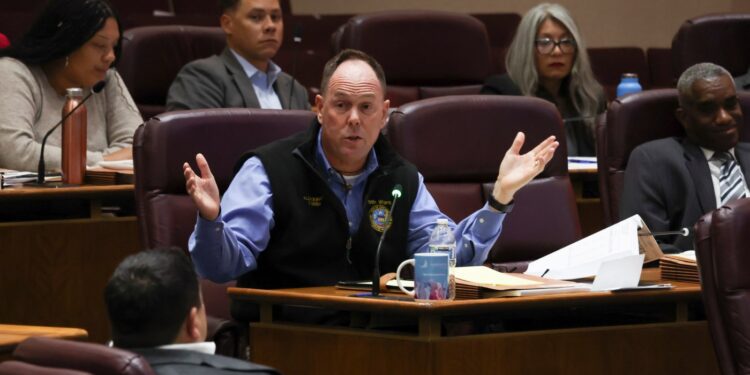
Desperate to avoid hitting Chicago home and business owners with a $300 million property tax increase, aldermen pelted the mayor’s finance team Wednesday with questions about alternatives to plug the 2025 budget hole.
Their pitches on the opening day of budget hearings ran the gamut from furlough days for city workers to cutting middle managers or halting programs funded with federal American Rescue Plan Act dollars.
Underpinning the exercise was the possibility Johnson won’t have the 26 votes he needs to pass his budget if it includes the hike. Southwest Side Ald. Matt O’Shea said the math doesn’t look good for the mayor.
A tally of conversations with fellow aldermen, emails and social media posts show “37 of my colleagues that have said publicly they can’t support a $300 million property tax increase,” he said.
“Either a lot of those people are being very dishonest or we have a real problem,” O’Shea said. “And what I’ve seen the past hour is, we’re still talking about the budget address that we heard a week ago, we need to start having conversations about what cuts, what efficiencies we’re going to look at,”
Johnson’s team has said the property tax hike was a painful, but necessary last resort. Without it, they say they would have to lay off thousands of city workers this year, and would still face a similar deficit next year. Those property taxes, for the most part, help the city pay down decades-old debts and rising pension obligations for retired city workers, costs past administrations have skimped on — because required state minimum payments were too low — or skipped.
“We will not repeat the failures of the past by spending money we do not have and bankrupting our future,” Chief Financial Officer Jill Jaworski said in her opening statement. Johnson’s $17.3 billion proposal “places paramount importance on long-term fiscal stability while directing resources toward historically disinvested communities,” and the property tax hike is the same as if the city had tied the levy to the rate of inflation in recent years.
The city’s total hike is $345 million. $300 million is an increase to the city’s base levy, budget officials said, while the rest includes new properties being added to the rolls or accounting for lost collections.
Other sources of revenue are difficult to come by, Jaworski said: “for longer term structural solutions, we look forward to working with our counterparts at the state,” she said, hinting at a growing need to extend the sales tax to services. For now, the city is pulling the revenue levers it can, she said.
Wednesday’s hearing made it clear several aldermen are at this point a no vote, regardless.
Ald. Marty Quinn, 13th, said the optics of granting raises to thousands of city employees made the property tax hike difficult to sell to constituents. But budget director Annette Guzman reminded him nearly the entire city workforce is unionized, and that most are only receiving raises because aldermen voted for them.
“Roughly 89-90% of our personnel in the city of Chicago are unionized labor personnel who receive step increases as well as (cost of living adjustments) based on contractual obligations that have been signed by City Council and prior City Councils,” Guzman said.
The finance team said they had looked at organizational charts each time they develop budgets.
Aldermen’s preference seemed to be deeper cuts.
Finance Chair Pat Dowell, 3rd, requested proof the budget office had undertaken a staffing analysis across the proposed 36,000-strong workforce to look for reductions. “I keep asking this, not just this administration, previous administrations, I asked the Police Department too, it doesn’t get done,” Dowell said.
Furlough days, if implemented immediately for non-union employees, would save roughly $2 million a day, Guzman said. Furloughs for union workers would require some negotiations or would be made difficult by current contracts. Dowell also requested a list of federal COVID-relief funded programs already under contract in 2025 and after, including penalty clauses for early termination.
Of the roughly $1.9 billion in COVID funds awarded to the city, Chicago has so far spent $1.606 billion and set aside $125 million more for specific programs.
O’Shea proposed systemic efficiencies, such as a merger of the city and county’s election authorities or animal control departments.
Some aldermen also questioned why the city couldn’t skip its planned $272 million supplemental pension payment and instead use the money to plug the hole. Those funds have come from one-time surpluses in previous years and “stabilizes our pension funds so that their funded ratios stop getting worse,” Jaworski said.
Without that extra funding, the already low balances for the city’s four pension funds decreases. The supplemental payment also helps bridge the gap until the city’s casino is fully operational, Jaworski said — a feat which will likely take years. The city is only counting on about $11.8 million in such revenues for 2025.
In other words, she said, “we have stopped the bleeding.”
The city plans to make a total of $1.2 billion in such payments through 2027. The estimated long-term savings are nearly $4 billion. “Making advance contributions through 2030 will save the city far more than our investment,” Jaworski said.
Originally Published:






